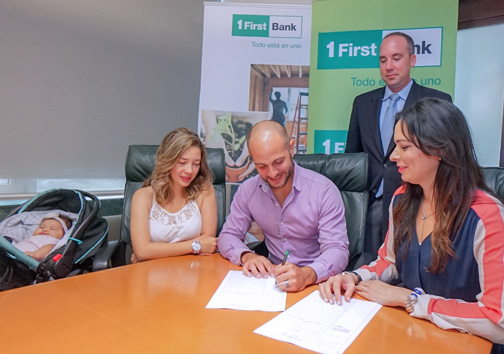FirstBank donates land to Siembra Vida for agrotourism project in Rincón


During the signing of the land transfer agreement in Rincón, from left: Dayhana Tamayo vice president and Josiah Hernández, president (and their child) from Siembra Vida; Nayda Rivera and Frederick Baraga-Huyke, from the Cancio, Nadal, Rivera & Díaz law firm.
FirstBank, through its Property Donation Program, announced the transfer of the ownership of 1,973 square meters of land in Rincón, to the Siembra Vida foundation.
In September 2015, Siembra Vida, a nonprofit using agriculture as a means of adaptation and rehabilitation for people in marginalized communities, entered a two-year agreement with FirstBank.
The land was leased to the foundation at a nominal cost for the purpose of constructing an agrotourism project. As part of the proposal, a small farm, a minimarket and a food truck have been developed on the property.
“At FirstBank we seek to support projects and initiatives that promote entrepreneurship–a cornerstone for the island’s economic development–and benefit communities,” said Nayda Rivera, executive vice-president of FirstBank, during the signing to transfer the title of the land with Siembra Vida President Josiah Hernández.
“We believe in the talent of enterprising young people such as Josiah. Providing a space for establishing their own business helped Siembra Vida become a self-sustained foundation, which, in turn, educates and empowers the community through agricultural workshops and certifications for participants in rehabilitation centers,” Rivera said.
During the last two years, Siembra Vida succeeded in benefiting a total of 280 participants with their projects, including children, youth and adults. They consistently receive groups of between 10 to 15 people from the western part of the island at their agriculture workshops and volunteer work programs.
“We thank FirstBank for believing in our project. We were confident we would be able to accomplish it, and are very happy for having reached so many people,” Hernández said.
“Before having the land, we used to go to homes to build vegetable gardens and conduct agricultural workshops,” he added.
“Now we can do so much more — impact more communities, obtain more crops and make advances in the foundation’s sustainability. We have generated seven jobs per year, which we expect to increase to 12 with the food truck,” Hernández said.














